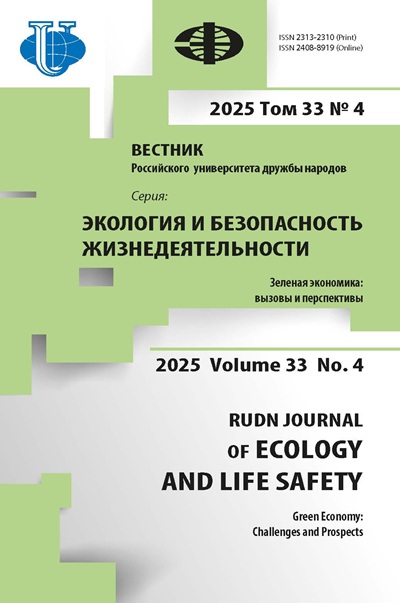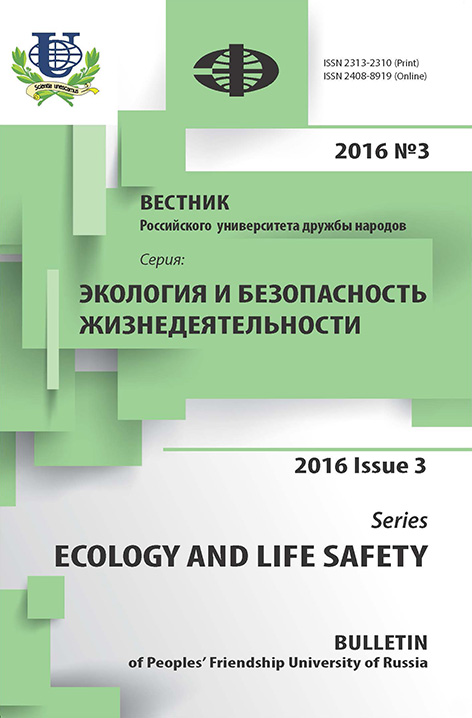MOOCS FOR TEACHING ESP TO ECOLOGICAL FACULTY STUDENTS
- Authors: Valeeva NG1, Rudneva MA1
-
Affiliations:
- Peoples’ Friendship University of Russia
- Issue: No 3 (2016)
- Pages: 99-105
- Section: Articles
- URL: https://journals.rudn.ru/ecology/article/view/14455
- ID: 14455
Cite item
Full Text
Abstract
The development of Internet technology and the globalization of education have fostered massive open online courses (MOOCs) for sciences and humanities. Various MOOCs are based on different methodological approaches such as connectionism, active learning, cooperative learning, implying autonomy and intrinsic motivation of students in acquiring the skills and abilities that are important for a career. Control of the acquisition is carried out by means of self-evaluation and peer-review using tests with AutoCheck, nonlinear tests with specific evaluation criteria. This form of training involves a fundamental change in the teaching methodology and promotes paradigm shift in the education system, due to changing access to learning materials, their method of presentation, monitoring and evaluation process. Besides the obvious advantages in terms of professional training, MOOCs can also be considered as an additional tool in teaching ESP. Most of the courses provided in the public domain, are in English, and involve leading specialists of the world’s best universities. Participation of students in these courses is not limited to the perceptual component, interactive open structure allows students to participate in forums, discussions, peer-review in the target language. Second-year undergraduate students of the Environmental Studies Faculty were assigned to participate in one of four MOOCs to choose from. For each MOOC project teams were formed, working on a group project throughout the course. The work was organized in blended learning format - independent individual work of each student on the content part of the course, the discussion within the group, preparing presentations, presenting their ideas to students from other working groups, followed by discussion. English teacher was in charge of facilitating discussions as well as evaluating presentations from the content and language point of view. A few positive aspect of MOOC integration were the possibility of independent work of students; high quality of the material; professional vocabulary development; built-in control system. There were also some disputable aspects, such as temporary access to courses as well as very generic approach to the matters discussed. Students who participated in the program were surveyed in order to identify the main difficulties that they experienced while working with MOOCs. In this article we present the results of the survey and will offer the main ways to overcome the problems.
Full Text
Массовые открытые онлайн-курсы (МООК) возникли как ответ на педагоги- ческие вызовы современности. Развитие новых технологий обусловливает не- обходимость появления новых форматов обучения. Такие факторы, как широкое распространение социальных сетей, современные мобильные технологии, высо- кая пропускная способность широкополосного Интернета и, наконец, глобали-99Вестник РУДН, серия Экология и безопасность жизнедеятельности, 2016, № 3зация общества привели к возникновению новых форматов преподавания [9]. Начавшись как образовательная инициатива отдельных учебных заведений, от- крывающих неограниченный доступ к своим курсам, МООК быстро завоевали популярность и к 2012 г. получили столь широкое распространение, что газета New York Times объявила его годом МООК [5].Что же делает МООК столь привлекательными для широкой публики? Первый важный фактор - бесплатность и доступность качественного образования. По- давляющее большинство МООК создается ведущими мировыми экспертами, что гарантирует не только высокое качество контента, но и отличную организацию и презентацию курсов. Второй важной особенностью является смещение фокуса образовательного процесса от преподавателя к студенту. Студенты самостоятель- но принимают решение о необходимости и достаточности прохождения курса, а также определяют объем своего взаимодействия с остальными участниками груп- пы [10]. Участники МООК более не довольствуются ролью пассивных слушателей, в рамках учебной группы они формируют пространство для взаимодействия, об- суждают те аспекты, которые считают действительно важными и интересными, а также оценивают своих коллег и получают отклики на свои работы [2]. Препо- давателю в такой ситуации отводится роль модератора, который предоставляет материал и технические возможности для взаимодействия и обсуждения.Существует несколько разновидностей МООК - так называемые си-МООК и икс-MOOК. Икс-МООК дублируют традиционную модель обучения и состоят из презентаций, опросов и тестов. Часто слабой стороной икс-МООК называют то, что они не создают новое знание, а лишь многократно повторяют старое и не выходят за рамки привычной образовательной парадигмы.В си-MOOК основное внимание уделяется взаимодействию с другими участ- никами группы. Главной целью си-MOOК является создание сообщества студен- тов, которые обсуждают свои результаты, совместно приходят к пониманию про- блем и, таким образом, создают новые идеи. Участие в таких группах подразуме- вает два вида деятельности - самообучение и взаимодействие. К самообучению относится ознакомление с материалами курса - чтение и прослушивание пре- зентаций. Участники курса проходят этот пусть самостоятельно. Взаимодействие с другими участниками группы проходит в рамках представления собственных идей и обсуждения идей коллег.Основной задачей МООК является ознакомление слушателей с новейшими разработками в той или иной предметной области. Как правило, такие курсы создаются и представляются на английском языке, языке общения международ- ного научного сообщества. Так как для большой части слушателей английский язык не является родным, создатели МООК стараются облегчить понимание - добавляют субтитры и транскрипты презентаций, предоставляют возможность проигрывать видеофайлы с нормальной или замедленной скоростью, делают пре- зентации короткими и емкими, дополняют каждую лекцию материалами для чте- ния, вопросами для обсуждения, тестами и опросами, возвращающими студентов к той части материала, которую они недостаточно хорошо поняли. С формальной точки зрения любой МООК - это логически выстроенный образовательный про-100Валеева Н.Г., Руднева М.А. Массовые открытые онлайн-курсы в обучении студентов...дукт с четким алгоритмом прохождения материала, еженедельными заданиями и встроенными системами контроля. Высокое качество материала, понятность и простота образовательной модели, а также широчайшее разнообразие МООК для любых специальностей, по нашему мнению, неизбежно должны обратить на себя внимание преподавателей английского языка для профессиональной коммуни- кации. В условиях снижения количества аудиторных часов и неуклонного роста требований к языковым компетенциям студентов обращение к МООК может стать отличным дополнением очным занятиям. Особенно это верно для обучения студентов экологического профиля. Количество специализированных учебников английского языка для студентов данной мало. А по количеству МООК экологи- ческие дисциплины лидируют, что предоставляет преподавателю большие воз- можности для адаптации и внедрения аутентичного материала в практический курс английского языка. В феврале-апреле 2016 г. 20 студентов второго курса бакалавриата экологического факультета РУДН приняли участие в педагогиче- ском эксперименте по внедрению МООК в курс обучения английскому языку. Было отобрано четыре курса, занимавших от трех до шести недель и проходивших в указанные сроки на платформе FutureLearn. Ниже приведена таблица с кратким описанием курсов.Примеры массовых открытых онлайн-курсов (МООК)Таблица 1НазваниеПродолжительностьУниверситет-провайдерEnvironmental Management: Social-Ecological Systems3 недели3 часа в неделюUniversity of LeedsIntroduction to Ecosystems6 недель3 часа в неделюThe Open UniversityElements of Renewable Energy4 недели3 часа в неделюThe Open UniversityMake an Impact: Sustainability for Professionals6 недель3 часа в неделюUniversity of BathБыли приняты следующие правила:студенты делились на мини-группы. Каждая мини-группа могла выбрать курс, максимально отвечающий интересам группы;каждая мини-группа готовила групповую презентацию для своих сокурс- ников;по результатам прохождения курса каждый участник подготовил небольшой реферат, в котором изложил свое видение курса и высказал свое мнение о со- держании обучения;всем студентам было предложено пройти анонимный опрос, целью кото- рого было выяснить, какие аспекты МООК понравились больше всего, а какие вызвали сложности.По результатам опроса 80% студентов прошли курс полностью. Такой высокий процент прохождения нетипичен для МООК, как правило, лишь 10% записав- шихся на курс успешно его завершают [8]. Безусловно, такой результат обуслов- лен смешанной моделью обучения - групповые презентации и реферат по за-101Вестник РУДН, серия Экология и безопасность жизнедеятельности, 2016, № 3вершении курса обеспечивают промежуточный и итоговый контроль. Оценива- ние работы студентов заставляет их уделять больше внимания прохождению курса. Считается, что внешний контроль наносит ущерб внутренней мотивации, являющейся залогом успеха педагогической модели МООК [3]. Однако интегри- рование дистанционных курсов в обучение иностранному языку не имеет смыс- ла без контроля и оценки результатов.С содержательной точки зрения 90% студентов оценили курсы положительно. При этом 40% опрошенных признали курс полезным и содержащим много новой интересной информации. В то же время 50% студентов сообщили, что многое из содержания курса было им уже знакомо и курс был для них лишь отчасти позна- вательным. А вот 10% студентов остались недовольны содержанием курсов и соч- ли их неинтересными.Мы также попросили студентов указать, какие сложности они испытывали при прохождении курса. В результате опроса были получены следующие данные: 80% студентов указали на сложности понимания на слух; 30% пожаловались на затруднения, связанные с непривычной формой подачи информации; 20% ис- пытывали технические сложности; у 10% затруднения вызвал междисциплинар- ный характер курсов: в социоэкологическом курсе им было сложно воспринять социологический компонент.Мы также попросили студентов оценить в процентном отношении степень понимания содержания курса в целом. По данным опроса, 40% студентов поня- ли более 70% курса без словаря; 40% - более 50% курса; 10% студентов были вынуждены прибегать к словарю в процессе обучения; 10% сочли МООК слиш- ком сложными с языковой точки зрения.Студенты получали ряд заданий для выполнения индивидуально и в группе, по завершении эксперимента мы попросили их оценить полезность и актуаль- ность заданий, а также ранжировать их по степени привлекательности. Мы полу- чили следующий перечень заданий в порядке убывания:групповые проекты;групповые обсуждения, ответы на вопросы;индивидуальные проекты;групповые презентации;индивидуальные презентации.Групповые проекты и обсуждения были оценены студентами как самый инте- ресный вид активности. Нужно отметить, что студенты часто организуют спон- танные учебные группы без участия преподавателя. Исследования показывают, что не все участники принимают равное участие в работе таких групп [1], однако в целом группа достигает лучших результатов, чем студенты, выполняющие за- дание индивидуально [7]. Такой вид деятельности, с одной стороны, продолжает реализацию концепции коннективизма, свойственную МООК. С другой стороны, модерирование групповых проектов по специальности требует вовлечения не только преподавателя английского языка, но и представителей профильных ка- федр факультета, способных разъяснять непонятные моменты и руководить дис- куссиями в рамках выбранной специальности.102Валеева Н.Г., Руднева М.А. Массовые открытые онлайн-курсы в обучении студентов...Мы также попросили студентов проанализировать, какие языковые навыки пригодились им при прохождении курса. Наименее полезным языковым навы- ком было признано письмо. Никто из студентов не принял участие в дискуссиях. В целом, такая модель коммуникативного поведения характерна для многих он- лайн-контекстов. Многие исследователи отмечают, что поведение участников МООК во многом схоже с поведением участников любых сетевых сообществ [4]: 90% пользователей только читают, 9% пишут редко и 1% пользователей участву- ют практически во всех дискуссиях [6]. Вторым по востребованности языковым навыком было понимание на слух: все студенты отметили, что испытывали за- труднения с восприятием лекций на иностранном языке, 70% признали, что с субтитрами текст был им понятен гораздо лучше, 30% признали, что не могут понимать лекции без субтитров. Самым полезным для прохождения курса навы- ком студенты назвали чтение. Это обстоятельство указывает на два важных аспек- та. Во-первых, затрудненное восприятие лекций на слух вызвано недостаточной сформированностью умений аудирования профессионально ориентированной иноязычной речи на уровнях детального и критического понимания. Во-вторых, МООК не способствуют эффективному развитию этих умений из-за доступности субтитров и транскриптов лекций. При самостоятельной работе все студенты в большей мере полагаются на чтение как на более привычный и комфортный вид деятельности.Внедрение МОООК в практику преподавания курса английского языка для профессиональной коммуникации имеет ряд положительных моментов:богатство и многообразие аутентичного профессионально ориентирован- ного учебного материала;понятная структура и прозрачная система оценки;сочетание аудирования, чтения и письма в рамках одного формата и под- ключение говорения на этапе групповой и индивидуальной работы, способству- ющие комплексному формированию умений данных видов деятельности;повышение мотивации и самостоятельности студентов, расширение про- фессионального кругозора;интеграция в мировое студенческое сообщество как дополнительный сти- мул к изучению иностранных языков.Среди сложностей, требующих преодоления, можно отметить следующие:несоответствие предлагаемых МООК учебному плану студентов;невозможность долгосрочного планирования из-за непредсказуемой до- ступности курсов;невозможность работы с курсами на экспертном уровне без привлечения специалистов профилирующих кафедр.В заключение отметим, что, несмотря на многочисленные вопросы, возника- ющие на пути внедрения МООК в курс обучения иностранному языку специаль- ности, мы видим большой потенциал в таком формате работы и высокий уровень заинтересованности студентов в смешанных форматах обучения на основе со- временных технологий. Особенно перспективным представляется внедрение про- фильных МООК в курс обучения научно-профессиональному общению на ино- странном языке на продвинутой ступени обучения в магистратуре и аспирантуре.×
About the authors
N G Valeeva
Peoples’ Friendship University of RussiaMiklukho-Maklay str., 6, Moscow, Russia, 117198
M A Rudneva
Peoples’ Friendship University of RussiaMiklukho-Maklay str., 6, Moscow, Russia, 117198
References
Supplementary files















